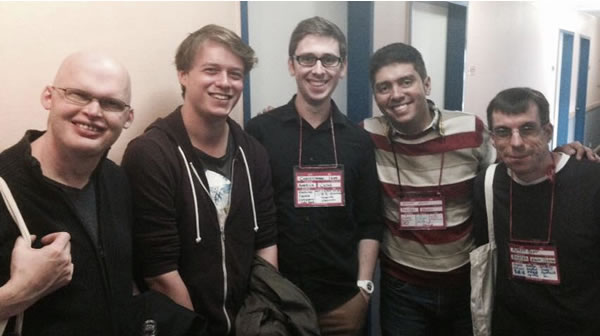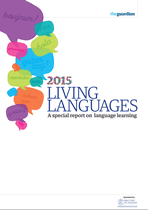This is a guest post by Benny Lewis, of Fluent in 3 Months. He’s launching a series of beginner guides for Chinese, French, Spanish, German, English and Italian this week, but in today’s post he wanted to write some tips here for those of you working on your more advanced skills!
If you’ve been studying a foreign language for a while, you’ve likely considered testing yourself to determine just how “good” you actually are. Many turn to the CEFR (Common European Framework of Reference for Languages), which provides a reliable standardized system to test and understand language levels.
While I’m usually known for my 3 month language “missions” to go from an absolute beginner to a B1/B2 level, this post is for the steps beyond those early stages. (If you are a beginner language learner then be sure to check out these brand new guides I have just created about getting started in particular languages.)
Drawing from my own experiences sitting the C2 level exams in both Spanish and German, I will share with you 5 methods for building your language level from CEFR’s B2 (“upper intermediate”) to C2 (“mastery”). But even if you aren’t preparing for a specific exam, these techniques will help you level up your language skills, regardless of your end goals.
Taking a Test vs. Developing Communication Skills
Studying for a test and for communication are not the same thing. With a test, your study needs to account for the specific format of the test, whereas day-to-day communication doesn’t require you to perform the same type of tasks. Your methods need to match your end goals with the language and, more importantly, the way you study for a test may not actually improve your ability to communicate in the language.
That probably sounds counterintuitive. After all, shouldn’t studying for a language test improve your communication ability? Essentially, tests have such specific requirements that you may need to step away from focusing on improving your conversation fluency, in favor of alternative methods.
Understanding the C2 Level and Parts of the Exam
The main difference between the B2 and C2 levels is being able to identify subtle differences and distinctions in how ideas are expressed. At C2 level, you’re understanding fine shades of meaning, so that you can express and understand a topic in a variety of ways.
CEFR level exams are broken up in to five parts: oral, writing, grammar, reading and listening, and we’re going to discuss specific methods to help you develop the skills you need for each part of the test.
1. Study Less to Improve Your Oral Skills
The oral part of the exam is where your ability to comfortably flow with the language comes in to play, and it’s difficult to develop a high level of oral skill if you’re always stuck inside a book.
Instead of focusing all of your energy on grammar rules and vocabulary flash cards, get out and meet with native speakers for at least an hour a day, speaking only in the target language. Can’t meet in person? Then find online conversations partners to meet with over Skype.
While I advise this for people who want to reach B1/B2 level too, what needs to change is what you talk about if you are aiming for Mastery. In my C-level conversations, I steer our chats to more advanced topics, like philosophy, politics, and have even had (friendly) debates with my teachers. In some sessions, I may watch a news report and have to give my opinion on it.
Forcing yourself outside of your comfort zone will open up new conversation topics to you. This comes with practice rather than studying. After your spoken session, take all the new words you learned or all the things you wish you could have said and revise that, but the bulk of your oral improvement needs to come from practice.
2. Write About Specific Topics, Over and Over Again
If you can speak confidently and correctly, then transferring that skill to writing is generally pretty easy. The main difference is to remove casual empty-softeners (“like”, “y’know”, “isn’t it?”) and conversational connectors which makes speech seem more natural, but doesn’t work in the written form.
One method I recommend is to practice writing about the themes that are common for the exam and then have them reviewed by a native speaker. Then, try to write (without referring to the original) on the same topic again, using different ways of expressing yourself. You can get free feedback on short texts on lang-8, but I recommend having someone familiar with the exam structure to correct much longer texts and offer more feedback than simple corrections, such as how you could develop your ideas more.
Since one of the main differences between B2 and C2 is your ability to understand subtle distinctions in ways of expression, it’s helpful to practice this skill by writing on similar topics in multiple ways. Be sure to have a native speaker review your different texts and explain how the feeling and nuanced meaning of one is different than the other.
3. Don’t Just Study Grammar, Use It!
To build your skills for the grammar test you will need to take a two-pronged approach.
First, study and learn to recognise grammatical patterns. CEFR examinations require an understanding of technical aspects of the language so you will need to study for the specific exam format. Look at past papers from the exam, and come up with as many possible iterations of of the answers as you can.
Second, enhance your study of technical grammar with regular practise of the rules you are learning. Schedule time with a native to review the grammar patterns you have studied and use them in actual communication.
This practical application of the material will help you build a deeper understanding, because the more you practice the rules, the more familiar they will become.
4. Build a Deep Understanding of Specific Vocabulary
The reading section in a C2 exam requires you to rephrase answers, extrapolate slightly, search through text for certain information and be able to produce vocabulary – not just recognise it. This is not the same as generally summarising a chapter of a book, for example.
To prepare, practice answering questions on texts for sample exams. Don’t just “read a lot”. Then run those answers through a native, and take note of key vocabulary that comes up again and again.
This may sound odd, but in my experience, reading more won’t necessarily improve your reading score on an exam. The focus in these exams is on an active and deep understanding of the language. When you see questions about a text you’re reading, you’ll need to demonstrate that you have a precise understanding of the words on the page, and this is much more about being familiar with specific vocabulary.
5. Create a Focused Environment for Listening and Taking Notes
Given the format for CEFR exams, passive listening will have little effect on improving your score. It is great for giving you a “feel” for the language and to get used to the sounds, but it doesn’t help you with the skills you need to develop at this level — focused listening and taking notes.
There are two things you can do to improve these skills. First, when you are listening to audio in the target language, use 100% of your focus on what you are hearing (not doing anything else at the same time). Try to hear and understand as many details as possible from the audio.
Second, practice taking notes. Start by listening to a 30 second segment of audio and write down as much as you can about what you’ve heard. The goal isn’t to write the text verbatim, but to make sure you can share specific details about the information. You can increase the challenge by extending the time by 15 second increments until you are comfortable taking notes for a 3 to 5 minute audio recording.
Make a Plan That Works For You
When you’re preparing for your next exam (or working to “level up” with your language), make a plan for your study. Don’t just leave it to chance or try to pick up things passively.
Although I’ve provided some methods here, you should still make sure that your study is always geared towards your specific ways of learning. Your “best” method for learning a language is going to be different than mine or someone else’s, so look at study methods more like a scientist experimenting with different theories. Test them out, see how they work for you, and then keep those that have the best results.
Studying for an exam is different than studying for daily use of a language. Plan your study to accommodate the specific requirements of the exam and focus on those methods that will provide your best results.

